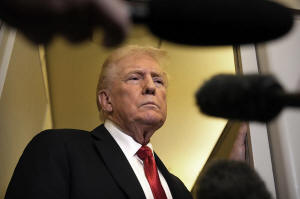Trump calls Colombia's Petro an ‘illegal drug leader’ and announces
tariffs and an end to US aid
[October 20, 2025]
By CHRIS MEGERIAN, DÁNICA COTO and ASTRID SUÁREZ
PALM BEACH, Fla. (AP) — The United States will slash assistance to
Colombia and enact tariffs on its exports because the country's leader,
Gustavo Petro, “does nothing to stop” drug production, President Donald
Trump said Sunday, escalating the friction between Washington and one of
its closest allies in Latin America.
In a social media post, Trump referred to Petro as “an illegal drug
leader” who is “low rated and very unpopular.” The Republican president
warned that Petro “better close up” drug operations “or the United
States will close them up for him, and it won’t be done nicely.”
Later in the day, Trump told reporters aboard Air Force One that
Colombia has “no fight against drugs” and “they are a drug manufacturing
machine" with “a lunatic” for a president. He said that he would
announce new tariffs on Monday.
Defense Secretary Pete Hegseth also announced the latest U.S. strike on
a vessel that was allegedly carrying “substantial amounts of narcotics.”
He said the vessel was associated with a Colombian rebel group — the
National Liberation Army, or ELN — that has been in conflict with
Petro’s government. He did not provide any evidence for his assertions,
but he shared a brief video clip of a boat engulfed in flames after an
explosion on Friday.
Petro, who can be as vocal on social media as his American counterpart,
rejected Trump’s accusations and defended his work to fight narcotics in
Colombia, the world’s largest exporter of cocaine.

“Trying to promote peace in Colombia is not being a drug trafficker,”
Petro wrote. He suggested that Trump was being deceived by his advisers,
described himself as “the main enemy” of drugs in his country and said
Trump was being “rude and ignorant toward Colombia.”
The Colombian Foreign Ministry described Trump’s statement as a “direct
threat to national sovereignty by proposing an illegal intervention in
Colombian territory.” Defense Minister Pedro Sánchez told reporters that
the country “has used all its capability and also lost men and women
fighting drug trafficking.”
Trump’s latest broadside against Petro raises the possibility of an
expanding clash in Latin America, where the U.S. has already increased
pressure on neighboring Venezuela and its leader, Nicolás Maduro.
American naval ships, fighter jets and drones are deployed in the region
for what the administration has described as an “armed conflict” with
drug cartels. Trump also authorized covert operations inside Venezuela.
Unlike Venezuela, Colombia is a longtime U.S. ally and the top recipient
of American assistance in the region. But coca cultivation reached an
all-time high last year, according to the United Nations, and there has
been fresh violence in rural areas where the government spent years
battling insurgents before reaching a peace deal a decade ago.
In September, the Trump administration accused Colombia of failing to
cooperate in the drug war, although at the time Washington issued a
waiver of sanctions that would have triggered aid cuts.
Colombia received an estimated $230 million in the U.S. budget year that
ended Sept. 30, a drop from recent years that exceeded $700 million,
according to U.S. figures.
Petro, Colombia’s first leftist president, has repeatedly feuded with
Trump this year. Petro initially rejected U.S. military flights of
deported migrants, leading Trump to threaten tariffs. The State
Department said it would revoke Petro’s visa when he attended the U.N.
General Assembly in New York because he told American soldiers to
disobey Trump’s orders.

[to top of second column]
|

President Donald Trump speaks to reporters aboard Air Force One,
Sunday, Oct. 19, 2025, en route to Joint Base Andrews, Md., as he
returns from a trip to Florida. (AP Photo/Mark Schiefelbein)

Petro and Trump have also been at odds over American strikes on
boats in the Caribbean. On Sunday, Petro accused the U.S. government
of assassination, pointing to a Sept. 16 strike that he said killed
a Colombian man named Alejandro Carranza. Petro said Carranza was a
fisherman with no ties to drug trafficking, and his boat was
malfunctioning when it was hit.
“The United States has invaded our national territory, fired a
missile to kill a humble fisherman, and destroyed his family, his
children. This is Bolívar’s homeland, and they are murdering his
children with bombs,” Petro wrote on social media. He said that he
asked his country’s attorney general’s office to initiate legal
proceedings internationally and in U.S. courts.
The White House and the Pentagon did not immediately respond to
requests for comment on Petro’s accusations.
Despite Petro’s criticism, his government plans to prosecute the
Colombian survivor of a more recent U.S. strike on a submersible
that was allegedly carrying drugs.
Another survivor was repatriated to Ecuador, where the Ministry of
the Interior said he would not face charges after prosecutors met
with him and determined that he had not committed any crimes within
the country’s borders.
The ELN, which Hegseth said was the target of Friday’s strike, has
long denied any role in drug trafficking and offered to submit to
the scrutiny of an international commission. It did not respond to
Hegseth's announcement. Colombian authorities regularly report the
dismantling of cocaine laboratories and the seizure of drugs
believed to belong to the guerrillas.
There have been seven U.S. strikes in the region since early
September that the administration says are targeting alleged drug
traffickers. At least 32 people have been killed.
Trump said Sunday that Petro had “a fresh mouth toward America.” He
complained that drug smuggling continues “despite large scale
payments and subsidies from the USA that are nothing more than a
long term rip off of America.”
“AS OF TODAY, THESE PAYMENTS, OR ANY OTHER FORM OF PAYMENT, OR
SUBSIDIES, WILL NO LONGER BE MADE TO COLOMBIA,” he added.

Elizabeth Dickinson, senior analyst for the Andes region at
International Crisis Group, said “it is befuddling and profoundly
unwise of the United States to alienate its strongest military
partner in Latin America at a moment when tension between Washington
and Venezuela are at its highest point in recent years.”
She said Washington and Bogota have long treated their relationship
as foundational, but “that wisdom is being thrown out the window,
with really catastrophic effects.”
Colombia lost significant U.S. funding when Trump slashed the U.S.
Agency for International Development earlier this year. More cuts
could affect military cooperation and undermine efforts to fight
rebel groups.
“If that is cut, we will see a strategic loss of capability for the
Colombian military and police at precisely the moment when they’re
confronting the greatest security crisis in Colombia for over a
decade,” she said.
___
Coto reported from San Juan, Puerto Rico, and Suárez from Bogotá,
Colombia.
All contents © copyright 2025 Associated Press. All rights reserved |